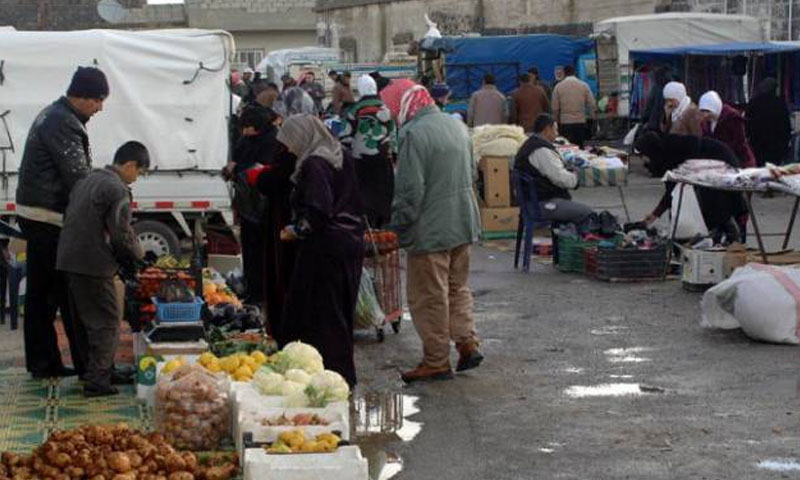Enab Baladi – Daraa
With the advent of Ramadan every year, markets witness increased activity, shaking the commercial recession in the local markets of Syrian governorates. However, this year, Daraa governorate is different, especially since it is the first Ramadan of the governorate after being back under the control of the Syrian regime.
The rise in prices of commodities, the devaluation of the Syrian currency and the low-income levels have all contributed to the reluctance of consumers from the markets, rendering them in a state of stagnation – except for basic necessities.
Food Products: High Prices and Inadequate Controls
The value of the Syrian Pound has recently dropped, approaching 570 against the US Dollar. When it stabilized, it seemed to fluctuate between the 540 and 550 marks. Therefore, the price of fuel increased and with it the prices of food products significantly rose as well, in the absence of controls in the southern governorate of Syria.
The prices of foodstuffs increased, with a kilogram of sugar reaching 300 Syrian pounds. The prices of rice, tea, oil, meat also increased, while chicken surpassed 900 Syrian pounds compared to more tolerable prices last season.
The owners of groceries and stories associate the rise in prices to the currency exchange rate, said Abu Karim, a resident of Daraa and the owner of a supermarket, speaking to Enab Baladi. He indicated that the rise in fuel costs has increased the cost of production, as well as the costs of transporting people and goods between governorates.
Abu Karim, 50, suggested that the increases in prices led to a decrease in demand, and that people in the area only shop for basic necessities – and frugally.
In general, residents in the Daraa Governorate complain about the situation of the market, as traders control the prices of commodities without complying with government regulations, some monopolize goods, which leads to even higher prices on the market.
Limited Income and Nonexistent Revenue
Residents living in areas which were controlled by the Syrian regime in July 2018, are in perpetual need due to the absence of humanitarian organizations that largely provided them with basic necessities. Additionally, the area is witnessing the lack of jobs, the absence of basic services, high unemployment rates, and the absence of young men due to displacement or recruitment in the compulsory military service.
Speaking to Enab Baladi, a former employee at the humanitarian organization Afak which was active in Daraa, and who preferred not to be named, said that due to the absence of NGOs, sources of income no longer exist for many young people. He suggested that he was once able to spend on his family, but that today he is restricted, and with his inability to travel and his lack of financial income, he became unemployed.
The state of recession in the governorate, and people’s limited income, left residents desperate to secure their basic needs.
Muhannad, a local of Daraa, owns of a confectionery shop. He said that sales from his shop had fallen by more than half over the last year, especially after the rise in costs of raw materials, which forced him to raise the prices of his products.
Muhannad, 30, added that citizens today seek to secure their basic necessities, and dispense with most luxuries.

